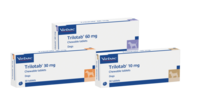Trilotab®
Improving quality of life for dogs with Cushing’s syndrome
Trilotab® is the first chewable, flavoured and divisible trilostane tablet for dogs.
Cushing’s syndrome, or hyperadrenocorticism (HAC), is one of the most common endocrine diseases seen in dogs:
![dog picto.png]() Affects approximately 1-2 dogs in every 1,0001
Affects approximately 1-2 dogs in every 1,0001
![pill picto.png]() Cushing’s syndrome can be difficult to diagnose because the most common clinical signs are non-specific to the disease and there is no single, highly accurate test to diagnose it. Tests can also be over-used which can make results difficult to interpret. As a result, the prevalence of the disease is expected to be much higher than reported
Cushing’s syndrome can be difficult to diagnose because the most common clinical signs are non-specific to the disease and there is no single, highly accurate test to diagnose it. Tests can also be over-used which can make results difficult to interpret. As a result, the prevalence of the disease is expected to be much higher than reported
![pill picto 2.png]() 85% of spontaneous cases are pituitary-dependent hypercortisolism (PDH) caused by an adrenocorticotrophic hormone (ACTH)-secreting pituitary adenoma. 15% of spontaneous cases are adreno-dependent hyperadrenocorticism (ADH) caused by a cortisol-secreting adrenocortical tumour (ACT)2
85% of spontaneous cases are pituitary-dependent hypercortisolism (PDH) caused by an adrenocorticotrophic hormone (ACTH)-secreting pituitary adenoma. 15% of spontaneous cases are adreno-dependent hyperadrenocorticism (ADH) caused by a cortisol-secreting adrenocortical tumour (ACT)2
General Information
 Tablets are easily divisible by 2 and 4 with “click tab” technology
Tablets are easily divisible by 2 and 4 with “click tab” technology
- Facilitates flexible and precise dose adjustment to find the tailored dose for the individual pet
- Enables easy administration and simplified, cost-effective dosing protocols for pet owners
- Tablets are stable outside of the blister packaging until the next administration
 Chewable, chicken flavoured tablets
Chewable, chicken flavoured tablets
• Designed to help improve treatment compliance
• Hydrolysed chicken flavouring to facilitate prescription in pets allergic to chicken
 Precise dosing with just 3 presentations
Precise dosing with just 3 presentations
• Trilotab® is available in 10mg, 30mg & 60mg presentations
• Reduces required stockholding in practice
Dosing
- Administer once daily with food
- Morning administration is recommended to facilitate monitoring tests 4 - 6 hours post-dosing
- Starting dose: 2mg trilostane/kg bodyweight
- Titrate the dose according to individual response. If a dose increase is required, use combinations of divided tablet sizes to slowly increase the daily dose.
- A wide range of divisible tablet sizes enables optimum dosing for the individual dog. Administer the lowest dose necessary to control the clinical signs.
References:
1. Schofield I, Brodbelt DC, Niessen SJM, Church DB, Geddes RF, O’Neill DG. Frequency and risk factors for naturally occurring Cushing’s syndrome in dogs attending UK primary-care practices. J Small Anim Pract. 2022 Apr;63(4):265-274. doi: 10.1111/jsap.13450. Epub 2021 Dec 8. PMID: 34881823; PMCID: PMC9299886. 2. Sanders, K., Kooistra, H.S. and Galac, S. (2018) Treating Canine Cushing’s Syndrome: Current Options and Future Prospects. The Veterinary Journal, 241, 42-51.


 Affects approximately 1-2 dogs in every 1,0001
Affects approximately 1-2 dogs in every 1,0001
